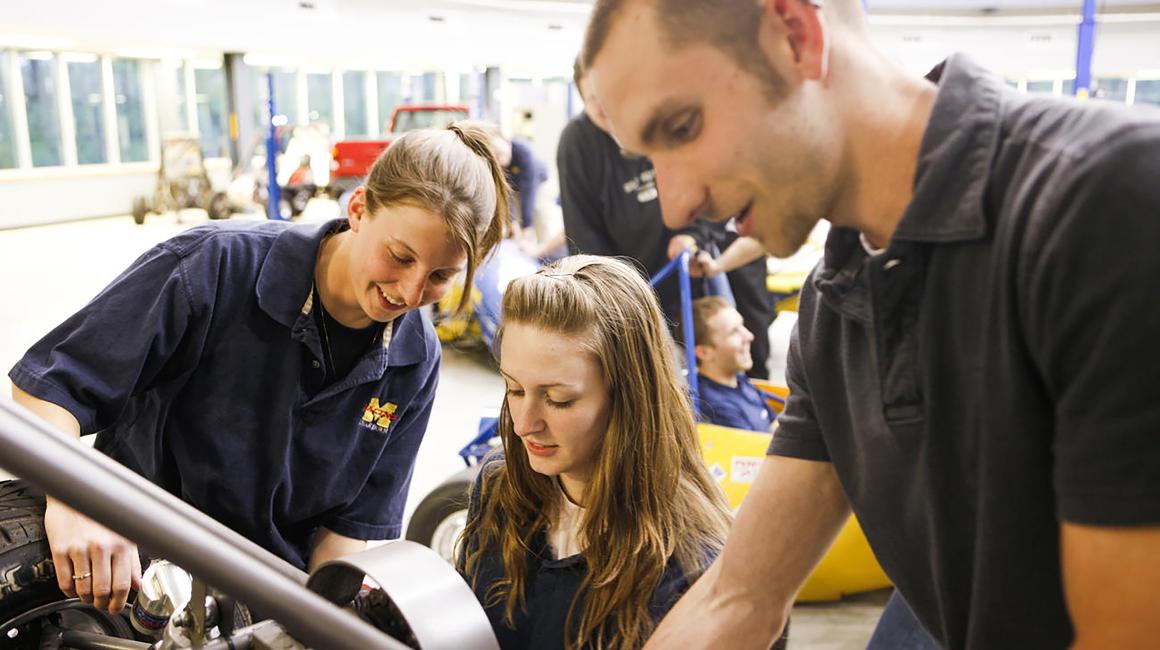
UM-Dearborn’s College of Engineering and Computer Science has been pouring a ton of energy into its doctoral programs over the past few years. CECS’ four departmental Ph.D. programs recently kicked off their affiliation with UM-Ann Arbor’s Rackham Graduate School. And now, the college is preparing to launch an entirely different breed of doctoral program — this one designed for fully-employed, part-time students coming from the auto industry.
Most notably, the new doctoral program in Automotive Systems and Mobility is not a Ph.D.; it’s actually a different type of terminal degree called a Doctor of Engineering or D.Eng. “Traditional Ph.D. programs typically focus on people who want to have an academic career,” explains Dewey Jung, an associate professor of mechanical engineering who’s helping spearhead the launch of the new program. “But we also wanted to serve a student whose goal is to grow as a technical leader in the space they’re already working in. That’s what a Doctor of Engineering is. It’s actually a more common kind of degree in Europe, where the educational goals tend to be more application oriented. So we are importing a bit of that Euro flavor because we see meaningful demand here for that type of degree.”
Jung said that demand is primarily coming from people who are currently employed in the local auto industry, but want to advance into research-oriented leadership roles in their fields or companies. That quality makes them obvious candidates for advanced education, but it can also make them a tricky demographic to serve. Because of their work commitments, fully employed students often pursue their studies part-time. And that, Jung told us, puts them at greater risk of attrition — or of producing dissertation research that’s obsolete by the time they’re able to finish their degree.
The beauty of the D.Eng program is that those potential liabilities morph into strengths. Take the research component of doctoral programs, for example. Since a prospective D.Eng student is already working in the industry, they have a field of expertise. And why not, Jung says, simply allow that to feed their research as D.Eng students? “For the part-time student, if your research and work are on two completely different things, the educational efficiency is very low. If they overlap, there’s built-in synergy between work life and student life.”
In fact, as part of their application to the D.Eng program, students will be asked to demonstrate their employer’s commitment to their education. That could be financial support or allowing some work time to be devoted to program-related research. In the latter case, Jung says, the distinction between work and school would be practically non-existent.
Jung is confident people employed in almost any area of the industry should be able to find a home in the program, due to its highly multidisciplinary design. In all, the D.Eng features nine different core research areas, ranging from autonomous vehicles to power trains to fleet electrification. And leaders from all four CECS departments, including Oleg Zikanov (ME), Sang-Hwan Kim (IMSE), Taehyung Kim (ECE), Jie Shen (CIS) — plus, CECS Dean Tony England and Associate Dean of Graduate Education and Research Yi Lu Murphey — were directly involved in creating the program.
And that, when you add it all up, means students could complete a relevant, doctoral degree, part-time, in just four years, all while never leaving their job and putting themselves in a position for a better one at the end of it all. They’ll still be really busy, Jung says. But part-time doctoral students may now have a clearer path to the finish line.
###
Are you interested in learning more about the D.Eng in Automotive Systems and Mobility at UM-Dearborn? Visit the official program page to read more or apply.




